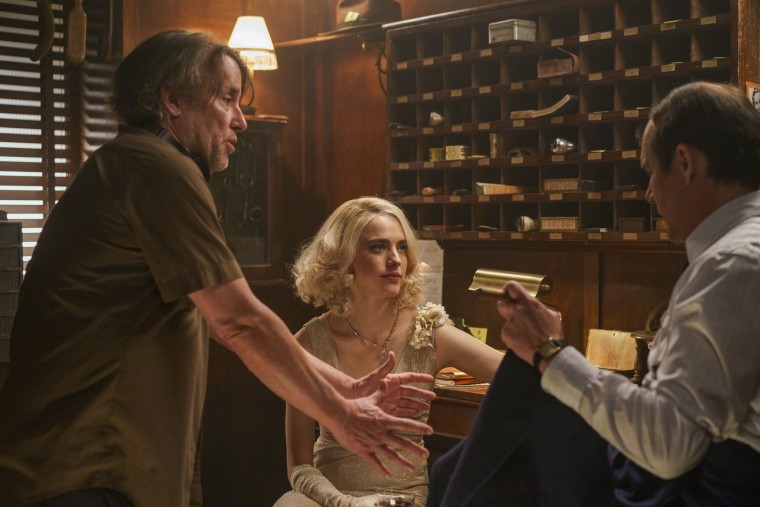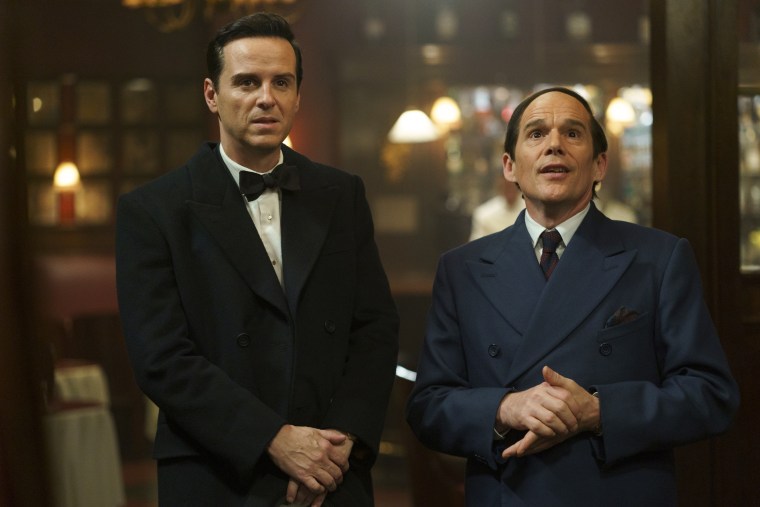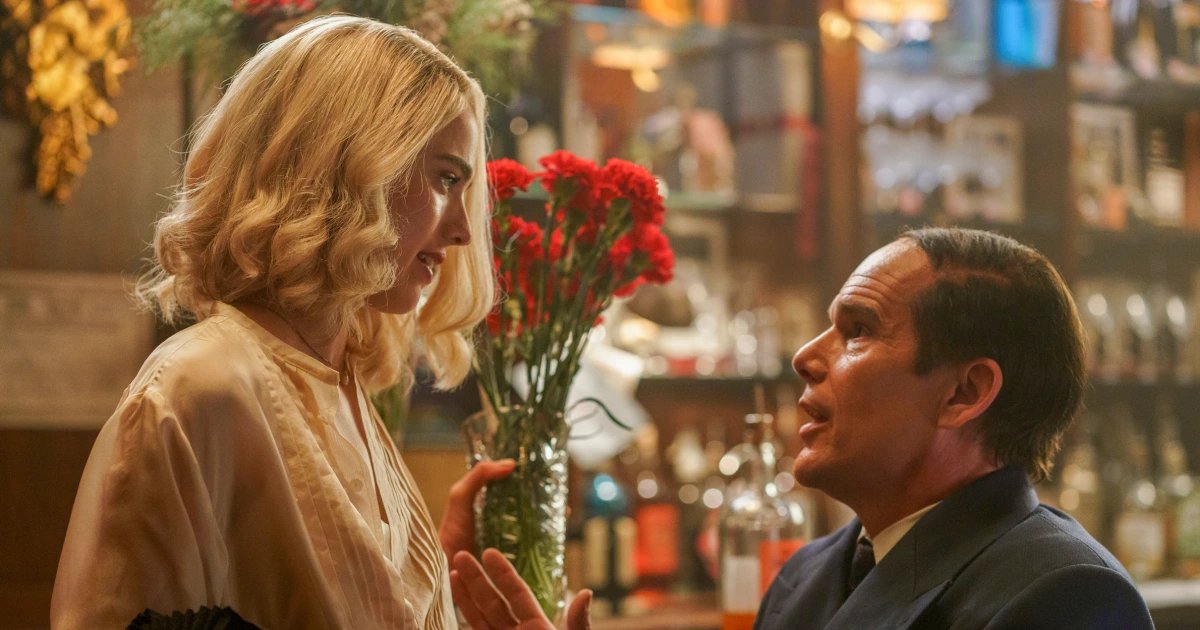Ethan Hawke and Richard Linklater have one of the all-time greatest partnerships between an actor and a filmmaker in cinematic history. After meeting in the early 1990s in New York City, where Linklater saw Hawke in a play that co-starred their mutual friend Anthony Rapp, Hawke and Linklater have worked together on the beloved “Before” trilogy, the decade-spanning “Boyhood,” and experimental indie hits such as “Tape” and “Waking Life.”
But for their ninth collaboration, which has been a dozen years in the making, Hawke and Linklater have chosen to examine the end of an artistic partnership. “Blue Moon,” directed by Linklater and written by Robert Kaplow, premieres in theaters Friday. It follows 20th-century lyricist Lorenz “Larry” Hart (Hawke) as he crashes the opening night party for “Oklahoma!,” the hit musical by his former partner, musician Richard Rodgers (Andrew Scott), and Rodgers’ new collaborator, Oscar Hammerstein II (Simon Delaney), at the legendary Sardi’s restaurant in New York City.
Starting in 1919 until Hart’s death of pneumonia in 1943, Rodgers and Hart combined their respective geniuses to create a string of musical comedy hits: “My Funny Valentine”; “The Lady Is a Tramp”; “Isn’t It Romantic?”; “My Heart Stood Still”; “Manhattan”; “Bewitched” and “Blue Moon.” In a career-best performance that could very well earn him his third acting nomination at the Academy Awards (and his fifth overall), Hawke captures Hart’s many contradictions as both a brilliant songwriter and an alcoholic with a penchant for self-destructive behavior.
“We always talked about this film as a little howl into the night of an artist being left behind. Not only by the times changing — ‘Oklahoma!’ is the future; his kind of music is the past — but his partner’s leaving him,” Linklater told NBC News in a joint interview with Hawke. “There’s a lot of movies about romantic breakups almost to the point that there’s kind of a similarity there, but not enough films about artistic breakups, which are so complex. Because, in this case, it’s not about the art. It’s really about Larry’s life and his addictions, his problems. He’s made himself hard to work with, and it’s just heartbreaking to see that relationship coming to an end.”

Hawke noted that “there’s an intimacy to artistic relationships” that is difficult to articulate.
“The relationship with Rodgers is the most important relationship in his life. It’s almost beyond a lover,” he said of Hart, whose working relationship with Rodgers spanned more than 1000 songs. “So to lose that is to lose a huge aspect of yourself, of your professional life, of your self-esteem — it’s all coming apart at its very foundations, because his whole identity is wrapped up in his relationship with Rodgers.”
Linklater, 65, first sent Hawke, 54, an early draft of Kaplow’s screenplay a dozen years ago, but Linklater said he felt Hawke was still too young — and, as the director joked, “too good-looking” — to play Hart in the final months of his life. Every few years, they would pull out the script and workshop the dialogue, which was crafted to gradually reveal details about Hart’s personal and professional lives. When the time came to finally step into Hart’s shoes, after years of researching the lyricist on his own time, Hawke joked that he was “stripped” of all of his “vanity.” The nearly 6-foot actor was made to look a foot shorter; given a balding, combover haircut; and was forced to adopt a completely new diction and set of mannerisms.
“Him perceiving himself as diminutive in status was essential to the way he interacted with the world. There’s a lot of people that talk a lot that are kind of blowhards, and they’re trying to dominate. Larry’s not trying to dominate. He’s trying to be seen,” Hawke explained. “If he’s not talking, if he’s not the smartest person in the room, if he’s not the funniest, if he’s not the most insightful, nobody notices him — that’s how he feels. He feels tossed away sexually, like he’s not a viable romantic interest for anyone. So things like the comb over, the bad skin, the awkward body language — all that stuff was essential to how he perceived himself so that the audience could understand who Larry was.”
In the April 2013 edition of The Atlantic, writer Robert Gottlieb reported that many of Hart’s contemporaries knew he was gay, but he still went to great lengths to try to conceal his sexuality. While writing “Blue Moon,” Kaplow got ahold of 11 letters addressed to Hart from a young woman named Elizabeth, who was a student at Yale University. The screenwriter chose to dramatize that relationship by having Elizabeth (played by Margaret Qualley) show up at Sardi’s on the opening night of “Oklahoma!” to meet Hart, a man more than twice her age who had become infatuated with her.

“I found that such an interesting part because today we forget that to be gay in the ’40s is to be underground. Your sexuality is against the f—ing law. You could be arrested,” Linklater said. “So even the people who worked with him, Larry’s sexuality was never on the table. Rogers never referenced it.”
Linklater found there was something “touching but very complex” about the short life of Hart, who died in 1943 at age of 48.
“It was a tough time to be around, but then he was born at the right time to do what he does with his gift, to write a thousand songs. They were doing so many shows,” he added. “So we benefit from that, that Larry Hart was alive at this time, but he suffered like so many because of the time he was in.”
Hawke said for his interpretation of Hart, “the pain of losing Rodgers is so great and so significant” that “he can’t actually absorb the impact of what’s happening to him.” Instead, “he’s distracting himself with a new wound”: his sexuality.
“He believes that an aspect of him is heterosexual, and he could live a normal life, and he sees her as a path to rescue,” Hawke said of Hart’s view of Elizabeth. “He has so much work to do before he’s the partner that Rodgers wants — this guy who’s showing up on time — and he’s not going to do that work. Elizabeth is another wonderful, glorious distraction like the alcohol.”
Hawke and Linklater acknowledged the irony of telling a story about an artistic breakup at a time when their own creative partnership has never been stronger. But whereas Hart and Rodgers worked only with each other for a quarter-century, Hawke said he and Linklater have “been lucky that we are not the only well we draw water from.”
“We’ve changed because having grown children changes you, time changes you, politics changes you. You have a different relationship to the community as an older person than you do as a younger person,” Hawke said of how his relationship with Linklater has evolved over time. “But the thing that probably would surprise people the most, what’s remarkable about it, is how consistent it’s been. We started talking in 1992, and we just kept talking.”
Linklater concurred, adding that he and Hawke have always been “really simple, in that we just want to do the work” at hand.
“No matter what’s going on, our priority is seemingly working and making movies, expressing ourselves. I think if I had become a raging alcoholic, or vice versa, the partnership would’ve drifted,” Linklater said with a laugh. “We’re lucky that 30 years later, we’re still on a similar track, I guess, until you’re not. That’s why this film about an artistic breakup is heartbreaking because it’s like, ‘Oh yeah, things do come to an end.’”


Leave a Reply